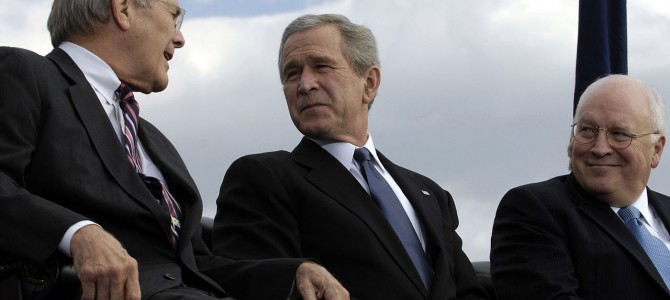There’s a lot of sanctimonious griping these days aimed at neoconservatives who are pontificating about Iraq on cable television and other venues. At the Atlantic, James Fallows captures the mood by declaring that Iraq War boosters “might have the decency to shut the hell up on this particular topic for a while.”
Certainly commentators have every right to point out that Dick Cheney – whose Wall Street Journal op-ed with Liz Cheney on Iraq states “Rarely has a U.S. president been so wrong about so much at the expense of so many” as Barack Obama — was wrong about the military engagement and the rebuilding but also about the idea of democratic contagion in the Middle East. But, then again, it’s also perfectly legitimate for neocons to point out that the Obama administration may have wasted the gains made by the previous administration. No president gets to start from scratch, after all. And Obama was bragging about the “extraordinary achievement, nearly nine years in the making” not so long ago, as he took credit for finishing the neocon project and facilitating its turnaround.
Now, I find neoconservatives arguments mostly unconvincing, but taking a reductionist view of a complex historical event and then pompously instructing everyone – and by everyone, we’re talking about the majority of Americans – to shut up, seems to be a bad habit on the left.
The president has constantly claimed that conservatives “drove us into a ditch,” via the imaginary free-market policies of George Bush, so they really had no standing to participate in the debate or offer an opinion about how we deal with recession. We hear this often. It’s a silly demand. And whatever the case, if the new bar for engaging in debate is being right on the big questions, it might be worth remembering a few other things. Namely, that in Washington everyone is wrong.
As Jonathan Chait points out:
Most Democrats in Congress opposed the Gulf War, warning of Saddam Hussein’s fearsome, World War I–style fortifications and citing 45,000 body bags as an indication of the likely U.S. death toll — predictions that turned out to be wildly incorrect. Why shouldn’t anti-Gulf war Democrats — that is, the vast majority of Democrats — have been excluded from subsequent foreign policy debates?
Now, I imagine people may argue that the consequences of losing war are far higher than being judicious about war. This might well be true, but just because one contingent on the left oppose any intervention anywhere and at any time, makes them more lucky than smart. But even if they were especially prescient a decade ago, attempting to shame dissent off the playing field, as David Frum did during the lead up to war, is as bad an idea now as it was in the lead-up to Iraq.
And let’s not forget that while many Republicans were wrong, there were others who were also wrong, others with access to intelligence and the ability to ask critical questions from people in power. They also voted on the matter. Shouldn’t they be held to the same level accountability as whipping boy Bill Kristol? One of these individuals is the shameless Harry Reid, who, when he isn’t wasting our time blathering about the Redskins and Koch Brothers, had the temerity to offer this statement: “If there’s one thing this country does not need, is that we should be taking advice from Dick Cheney on wars. Being on the wrong side of Dick Cheney is being on the right side of history.”
If only things were that easy. Reid wasn’t simply a supporter of war, he argued for it. In an interview in 2002 with Judy Woodruff, as well as in other appearances, he reiterated that Saddam Hussein had “thumbed his nose at the world community” (the same formulation Bush used many times) and was in possession if WMDs and was confident there would be a good debate. The opposition party has a duty to challenge those in power. Did Reid do a good enough job? It was only later that Reid would call the Iraq war a “failure,” and when things seemed to have turned a corner post-surge he taking credit for pressuring Bush into deploy more troops — which hardly sounds like a person who’s sorry about his vote.
The same can be said for Joe Biden and John Kerry. Shouldn’t they all shut up, too? Another person who voted for the war will be running for president soon, Hillary Clinton. The most consequential vote she’s ever had, perhaps the only consequential vote she ever had … and now we hear that she “got it wrong. Plain and simple.” And that’s great. But is that all it takes to rejoin the discussion? Flowing with the current of public opinion means you can now participate in the conversation; failing to do so means you should zip it.
Of course, if we use the same standard for the Obama Administration and its never-ending ability to make preposterous claims about the future of the economy, I would be all for zipping it. Should Jared Bernstein, one of the authors of the notorious “jobs chart” that helped sell the stimulus plan, still be taken seriously? Should Robert Gibbs or Stephanie Cutter, who were wrong about everything, freely pontificate on television about anything? Should Katrina Vanden Heuvel, who has gotten exactly one thing right in decades, be taken seriously when demanding accountability? What about folks who still predict the decades-old War on Poverty can work? Some of these people are partisan hacks and some of them are willfully misleading and some of them have pretty compelling arguments. No doubt I’ve been wrong plenty. Pointing this out is more than reasonable. Seems to me, though, people who opposed the war would realize that telling people to shut up isn’t exactly conducive to a healthy debate.
Follow David Harsanyi on Twitter.









